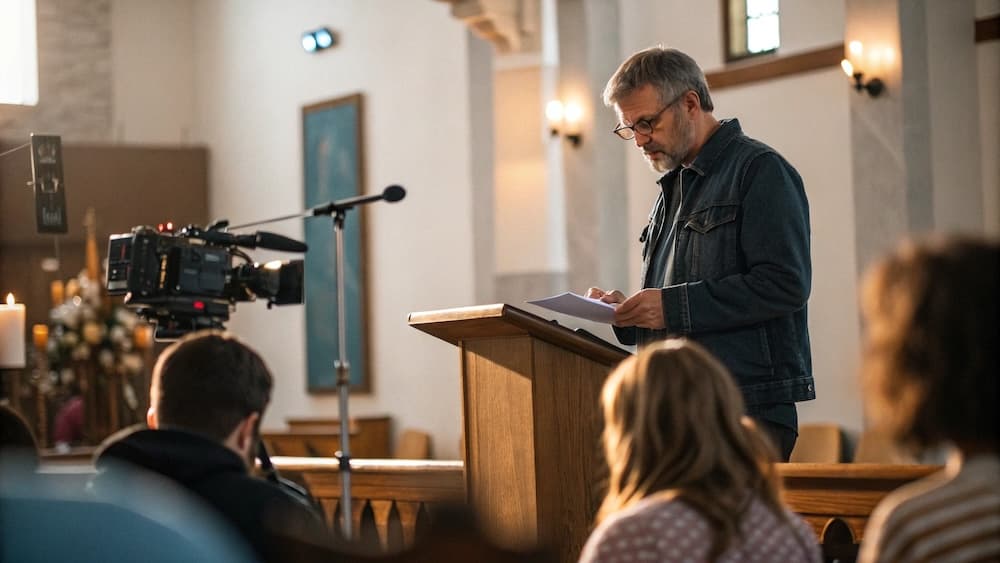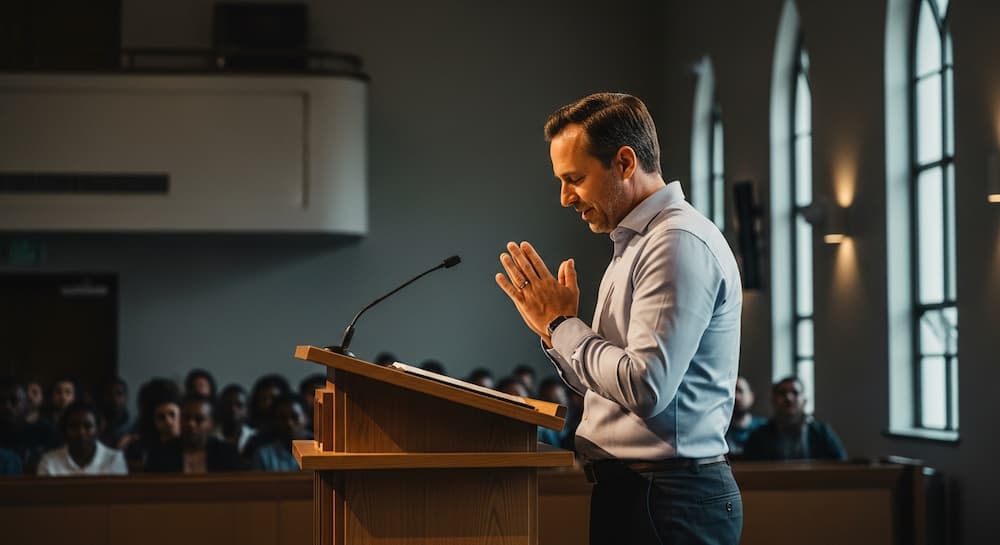7 Keys for Planning a Church Retreat
A church retreat is one of the best ways for your community to grow together in Christ, unplug from technology, and reflect on what God has done in gratitude. It’s also an activity that nearly any church can organize and execute–regardless of size and resources.

When I became a Christian 14 years ago, one of the most powerful experiences I had with my new community was a weekend church retreat.
Over fifty college students drove up to the mountains in New Hampshire to worship, learn, and fellowship. We spent time together praying, went on a rigorous hike up Mount Monadnock, and played games outdoors. It was a time of getting away from campus to form deeper relationships and focus on Jesus. And it changed me for the better.
A church retreat is one of the best ways for your community to grow together in Christ, unplug from technology, and reflect on what God has done in gratitude. It’s also an activity that nearly any church can organize and execute–regardless of size and resources.
But planning a church retreat shouldn’t be done carelessly. A successful retreat requires strategy, careful planning, a team of volunteers, a schedule, and most importantly, a vision for the weekend.
Below, we’ll answer some of the most commonly asked questions about church retreats, as well as share seven keys you can use to plan and execute a church retreat that’s impactful, organized, and most importantly, God-centered.
How Do You Prepare for a Church Retreat?
Preparing for a church retreat requires both the right planning and the right technology.
Most importantly, you need a messaging tool that can help you get the word out about your retreat. You’ll want to create an email campaign and texting sequence to spread the word and remind your church members to register.
Tithe.ly Messaging can help you create beautiful, drag-and-drop (read: super easy to build!) emails with retreat details. You can also use Tithe.ly Messaging to send automated text messages to retreat participants. Payment reminders, a packing list, and exciting sneak peeks of what will happen at the retreat are all great ways to build anticipation and stay organized.
Internal planning for the retreat is just as important as spreading the word in your community. Tithe.ly ChMS and Tithe.ly People are administrative tools that you can use to communicate with staff and keep track of who is coming.
If you’d like to learn more about how Tithe.ly can help you prepare for your retreat with tools and technology for giving, administration, communication, and more–click here.
How Do You Structure a Church Retreat?
Structuring a church retreat is no simple task.
You’ll want to balance times of rest and reflection with intentional worship, prayer, and teaching. You’ll want your church family to meet God, but also to spend time forming deeper relationships with one another. Finally, you’ll want to provide room for the Holy Spirit to direct the course of the weekend without completely throwing out the schedule.
Fortunately, there’s no “wrong” way to structure your retreat. The important thing is to gather with staff and leaders, ask God to guide the vision and purpose of the retreat, and do your best at balance.
Here are several portions of the retreat that you’ll want to consider:
- Teaching. Typically, retreats are focused around multiple sessions of teaching. Think through the purpose and vision of your weekend, and plan teaching sessions accordingly.
- Worship. Retreats are a wonderful time to have extended moments of worship. If you typically run a 30-minute worship set during your weekend service, consider planning extended times of worship into your schedule.
- Prayer. Do you want to incorporate prayer into your retreat? Consider how you might plan for corporate prayer during different sessions, or even plan an early morning prayer meeting.
- Response. Create space and time for people to respond to teaching. Retreats are especially effective for giving busy church members time to absorb teaching and pray more deeply about what they’ve heard.
- Meals. How long will your meals be, and how many meals will you have? You can bet that your retreat participants will often be thinking about lunch or dinner–make sure to schedule time into the schedule for chowing down.
- Games and fun. Plan for optional games and activities, where your retreat participants can fellowship via some friendly competition (or get some much-needed downtime).
The most important part of planning an itinerary is to determine the vision of your retreat. Is your retreat focused on rest and fellowship? Or is it an intentional deep dive into a particular aspect of the Christian walk? Is it primarily focused on Scripture reading, or would you like to focus on extended worship and prayer?
In any case, you’ll want to pray through the vision of your retreat and make decisions about scheduling accordingly.
7 Keys for Planning a Successful Weekend Retreat
Next, we’ll cover specific keys for planning and executing a successful retreat.
1) Appoint leaders.
A church retreat is a wonderful opportunity for your volunteers to step into greater leadership.
Instead of relying on the lead pastor to guide the retreat, appoint leaders to introduce different sessions, organize games, communicate information about room assignments, pray for meals, and plan for special activities.
Post-retreat, your volunteers will feel more valued, appreciated, and empowered to take the lead in the future–a win-win for everyone!
2) Create rules and guidelines.
Rules and guidelines are critical for a smooth, successful retreat.
Especially if you’re running a retreat with your youth group, you’ll want to create structure that ensures your youth are getting the most out of the weekend. “Lights out,” rules about noise, and general guidelines for technology use, meals, bathroom, and clean-up are all helpful for creating a more orderly retreat. The same rules apply to adults, as well!
Of course, retreat weekends are also a fun opportunity to go on adventures, have late-night chats, and stir up a little trouble. Try to toe the balance between overly restrictive and a total free-for-all.
3) Pray.
Pray for your retreat, during your retreat, and after your retreat. In the midst of planning and excitement, it can be easy to forget that prayer is at the center of what will make the retreat truly effective. Plan a few short prayer meetings before leaving for the weekend, and pray with your staff in between sessions. Finally, follow up with prayer after the retreat. Pray that your retreat goers will stick with new convictions, continue walking in rest, and remember all that they have learned.
If your retreat goers leave the weekend feeling refreshed, filled up with God, and newly invigorated in their walk with Jesus, then you’ve had a successful retreat!
4) Get creative about location.
Here are some creative ideas for churches that don’t have access to a local retreat center:
- Go camping. Camping is a fun, cost-effective way to gather your church together in the great outdoors and meet with God in a unique environment. Just make sure you have a plan for food preparation, and a designated place to meet for teaching sessions.
- Meet in someone’s home. Does one of your church members have a large home or a vacation house? Plan for a one-day retreat, or a very small retreat, where you can stay in someone’s home.
- Rent a couple of airbnb’s. Airbnb is a cost-effective option for renting out homes for multiple guests. Look for a couple of homes that are close together, then choose a place to share meals and meet for teaching (a large backyard works great!)
At the end of the day, your retreat isn’t about location, or picturesque scenery. It’s about meeting with God–and each other–during a weekend that’s set apart.
5) Plan a surprise.
Planning a surprise for the retreat can help make the weekend extra memorable. Introduce a surprise speaker, plan for spontaneous s’mores by the firepit, or throw a quick celebration for someone’s birthday, anniversary, or pregnancy announcement. Your church members will love a fun event that’s not on the schedule.
6) Bring plenty of food.
Even if you’re meeting at a retreat center with a kitchen staff and dining options, bring plenty of snacks and beverages. Home-baked goods, sparkling water, fruit, trail mix, hot chocolate, beef jerky, and protein bars are great options for satiating hunger in between sessions and meals. You can even organize a “Best Cookie” contest to up the ante and create fun competition.
7) Invite others.
A church retreat doesn’t have to be exclusive to your own church members. Use the opportunity to reach out to non-churchgoers, and extend the invitation to friends, neighbors, and coworkers. Coming together with the Body of Christ for an entire weekend can be a powerful way to experience the love of God, and get a true taste of what following Jesus is really about.
A Final Note
As a church leader, don’t forget to enjoy the retreat yourself. Plan for your own devotional time, engage during worship, and connect with friends and family. The retreat weekend will certainly be busy, but you shouldn’t leave absolutely drained. Give yourself time to rest, and most importantly, to connect with God.
Sign Up for Product Updates
When I became a Christian 14 years ago, one of the most powerful experiences I had with my new community was a weekend church retreat.
Over fifty college students drove up to the mountains in New Hampshire to worship, learn, and fellowship. We spent time together praying, went on a rigorous hike up Mount Monadnock, and played games outdoors. It was a time of getting away from campus to form deeper relationships and focus on Jesus. And it changed me for the better.
A church retreat is one of the best ways for your community to grow together in Christ, unplug from technology, and reflect on what God has done in gratitude. It’s also an activity that nearly any church can organize and execute–regardless of size and resources.
But planning a church retreat shouldn’t be done carelessly. A successful retreat requires strategy, careful planning, a team of volunteers, a schedule, and most importantly, a vision for the weekend.
Below, we’ll answer some of the most commonly asked questions about church retreats, as well as share seven keys you can use to plan and execute a church retreat that’s impactful, organized, and most importantly, God-centered.
How Do You Prepare for a Church Retreat?
Preparing for a church retreat requires both the right planning and the right technology.
Most importantly, you need a messaging tool that can help you get the word out about your retreat. You’ll want to create an email campaign and texting sequence to spread the word and remind your church members to register.
Tithe.ly Messaging can help you create beautiful, drag-and-drop (read: super easy to build!) emails with retreat details. You can also use Tithe.ly Messaging to send automated text messages to retreat participants. Payment reminders, a packing list, and exciting sneak peeks of what will happen at the retreat are all great ways to build anticipation and stay organized.
Internal planning for the retreat is just as important as spreading the word in your community. Tithe.ly ChMS and Tithe.ly People are administrative tools that you can use to communicate with staff and keep track of who is coming.
If you’d like to learn more about how Tithe.ly can help you prepare for your retreat with tools and technology for giving, administration, communication, and more–click here.
How Do You Structure a Church Retreat?
Structuring a church retreat is no simple task.
You’ll want to balance times of rest and reflection with intentional worship, prayer, and teaching. You’ll want your church family to meet God, but also to spend time forming deeper relationships with one another. Finally, you’ll want to provide room for the Holy Spirit to direct the course of the weekend without completely throwing out the schedule.
Fortunately, there’s no “wrong” way to structure your retreat. The important thing is to gather with staff and leaders, ask God to guide the vision and purpose of the retreat, and do your best at balance.
Here are several portions of the retreat that you’ll want to consider:
- Teaching. Typically, retreats are focused around multiple sessions of teaching. Think through the purpose and vision of your weekend, and plan teaching sessions accordingly.
- Worship. Retreats are a wonderful time to have extended moments of worship. If you typically run a 30-minute worship set during your weekend service, consider planning extended times of worship into your schedule.
- Prayer. Do you want to incorporate prayer into your retreat? Consider how you might plan for corporate prayer during different sessions, or even plan an early morning prayer meeting.
- Response. Create space and time for people to respond to teaching. Retreats are especially effective for giving busy church members time to absorb teaching and pray more deeply about what they’ve heard.
- Meals. How long will your meals be, and how many meals will you have? You can bet that your retreat participants will often be thinking about lunch or dinner–make sure to schedule time into the schedule for chowing down.
- Games and fun. Plan for optional games and activities, where your retreat participants can fellowship via some friendly competition (or get some much-needed downtime).
The most important part of planning an itinerary is to determine the vision of your retreat. Is your retreat focused on rest and fellowship? Or is it an intentional deep dive into a particular aspect of the Christian walk? Is it primarily focused on Scripture reading, or would you like to focus on extended worship and prayer?
In any case, you’ll want to pray through the vision of your retreat and make decisions about scheduling accordingly.
7 Keys for Planning a Successful Weekend Retreat
Next, we’ll cover specific keys for planning and executing a successful retreat.
1) Appoint leaders.
A church retreat is a wonderful opportunity for your volunteers to step into greater leadership.
Instead of relying on the lead pastor to guide the retreat, appoint leaders to introduce different sessions, organize games, communicate information about room assignments, pray for meals, and plan for special activities.
Post-retreat, your volunteers will feel more valued, appreciated, and empowered to take the lead in the future–a win-win for everyone!
2) Create rules and guidelines.
Rules and guidelines are critical for a smooth, successful retreat.
Especially if you’re running a retreat with your youth group, you’ll want to create structure that ensures your youth are getting the most out of the weekend. “Lights out,” rules about noise, and general guidelines for technology use, meals, bathroom, and clean-up are all helpful for creating a more orderly retreat. The same rules apply to adults, as well!
Of course, retreat weekends are also a fun opportunity to go on adventures, have late-night chats, and stir up a little trouble. Try to toe the balance between overly restrictive and a total free-for-all.
3) Pray.
Pray for your retreat, during your retreat, and after your retreat. In the midst of planning and excitement, it can be easy to forget that prayer is at the center of what will make the retreat truly effective. Plan a few short prayer meetings before leaving for the weekend, and pray with your staff in between sessions. Finally, follow up with prayer after the retreat. Pray that your retreat goers will stick with new convictions, continue walking in rest, and remember all that they have learned.
If your retreat goers leave the weekend feeling refreshed, filled up with God, and newly invigorated in their walk with Jesus, then you’ve had a successful retreat!
4) Get creative about location.
Here are some creative ideas for churches that don’t have access to a local retreat center:
- Go camping. Camping is a fun, cost-effective way to gather your church together in the great outdoors and meet with God in a unique environment. Just make sure you have a plan for food preparation, and a designated place to meet for teaching sessions.
- Meet in someone’s home. Does one of your church members have a large home or a vacation house? Plan for a one-day retreat, or a very small retreat, where you can stay in someone’s home.
- Rent a couple of airbnb’s. Airbnb is a cost-effective option for renting out homes for multiple guests. Look for a couple of homes that are close together, then choose a place to share meals and meet for teaching (a large backyard works great!)
At the end of the day, your retreat isn’t about location, or picturesque scenery. It’s about meeting with God–and each other–during a weekend that’s set apart.
5) Plan a surprise.
Planning a surprise for the retreat can help make the weekend extra memorable. Introduce a surprise speaker, plan for spontaneous s’mores by the firepit, or throw a quick celebration for someone’s birthday, anniversary, or pregnancy announcement. Your church members will love a fun event that’s not on the schedule.
6) Bring plenty of food.
Even if you’re meeting at a retreat center with a kitchen staff and dining options, bring plenty of snacks and beverages. Home-baked goods, sparkling water, fruit, trail mix, hot chocolate, beef jerky, and protein bars are great options for satiating hunger in between sessions and meals. You can even organize a “Best Cookie” contest to up the ante and create fun competition.
7) Invite others.
A church retreat doesn’t have to be exclusive to your own church members. Use the opportunity to reach out to non-churchgoers, and extend the invitation to friends, neighbors, and coworkers. Coming together with the Body of Christ for an entire weekend can be a powerful way to experience the love of God, and get a true taste of what following Jesus is really about.
A Final Note
As a church leader, don’t forget to enjoy the retreat yourself. Plan for your own devotional time, engage during worship, and connect with friends and family. The retreat weekend will certainly be busy, but you shouldn’t leave absolutely drained. Give yourself time to rest, and most importantly, to connect with God.
podcast transcript
When I became a Christian 14 years ago, one of the most powerful experiences I had with my new community was a weekend church retreat.
Over fifty college students drove up to the mountains in New Hampshire to worship, learn, and fellowship. We spent time together praying, went on a rigorous hike up Mount Monadnock, and played games outdoors. It was a time of getting away from campus to form deeper relationships and focus on Jesus. And it changed me for the better.
A church retreat is one of the best ways for your community to grow together in Christ, unplug from technology, and reflect on what God has done in gratitude. It’s also an activity that nearly any church can organize and execute–regardless of size and resources.
But planning a church retreat shouldn’t be done carelessly. A successful retreat requires strategy, careful planning, a team of volunteers, a schedule, and most importantly, a vision for the weekend.
Below, we’ll answer some of the most commonly asked questions about church retreats, as well as share seven keys you can use to plan and execute a church retreat that’s impactful, organized, and most importantly, God-centered.
How Do You Prepare for a Church Retreat?
Preparing for a church retreat requires both the right planning and the right technology.
Most importantly, you need a messaging tool that can help you get the word out about your retreat. You’ll want to create an email campaign and texting sequence to spread the word and remind your church members to register.
Tithe.ly Messaging can help you create beautiful, drag-and-drop (read: super easy to build!) emails with retreat details. You can also use Tithe.ly Messaging to send automated text messages to retreat participants. Payment reminders, a packing list, and exciting sneak peeks of what will happen at the retreat are all great ways to build anticipation and stay organized.
Internal planning for the retreat is just as important as spreading the word in your community. Tithe.ly ChMS and Tithe.ly People are administrative tools that you can use to communicate with staff and keep track of who is coming.
If you’d like to learn more about how Tithe.ly can help you prepare for your retreat with tools and technology for giving, administration, communication, and more–click here.
How Do You Structure a Church Retreat?
Structuring a church retreat is no simple task.
You’ll want to balance times of rest and reflection with intentional worship, prayer, and teaching. You’ll want your church family to meet God, but also to spend time forming deeper relationships with one another. Finally, you’ll want to provide room for the Holy Spirit to direct the course of the weekend without completely throwing out the schedule.
Fortunately, there’s no “wrong” way to structure your retreat. The important thing is to gather with staff and leaders, ask God to guide the vision and purpose of the retreat, and do your best at balance.
Here are several portions of the retreat that you’ll want to consider:
- Teaching. Typically, retreats are focused around multiple sessions of teaching. Think through the purpose and vision of your weekend, and plan teaching sessions accordingly.
- Worship. Retreats are a wonderful time to have extended moments of worship. If you typically run a 30-minute worship set during your weekend service, consider planning extended times of worship into your schedule.
- Prayer. Do you want to incorporate prayer into your retreat? Consider how you might plan for corporate prayer during different sessions, or even plan an early morning prayer meeting.
- Response. Create space and time for people to respond to teaching. Retreats are especially effective for giving busy church members time to absorb teaching and pray more deeply about what they’ve heard.
- Meals. How long will your meals be, and how many meals will you have? You can bet that your retreat participants will often be thinking about lunch or dinner–make sure to schedule time into the schedule for chowing down.
- Games and fun. Plan for optional games and activities, where your retreat participants can fellowship via some friendly competition (or get some much-needed downtime).
The most important part of planning an itinerary is to determine the vision of your retreat. Is your retreat focused on rest and fellowship? Or is it an intentional deep dive into a particular aspect of the Christian walk? Is it primarily focused on Scripture reading, or would you like to focus on extended worship and prayer?
In any case, you’ll want to pray through the vision of your retreat and make decisions about scheduling accordingly.
7 Keys for Planning a Successful Weekend Retreat
Next, we’ll cover specific keys for planning and executing a successful retreat.
1) Appoint leaders.
A church retreat is a wonderful opportunity for your volunteers to step into greater leadership.
Instead of relying on the lead pastor to guide the retreat, appoint leaders to introduce different sessions, organize games, communicate information about room assignments, pray for meals, and plan for special activities.
Post-retreat, your volunteers will feel more valued, appreciated, and empowered to take the lead in the future–a win-win for everyone!
2) Create rules and guidelines.
Rules and guidelines are critical for a smooth, successful retreat.
Especially if you’re running a retreat with your youth group, you’ll want to create structure that ensures your youth are getting the most out of the weekend. “Lights out,” rules about noise, and general guidelines for technology use, meals, bathroom, and clean-up are all helpful for creating a more orderly retreat. The same rules apply to adults, as well!
Of course, retreat weekends are also a fun opportunity to go on adventures, have late-night chats, and stir up a little trouble. Try to toe the balance between overly restrictive and a total free-for-all.
3) Pray.
Pray for your retreat, during your retreat, and after your retreat. In the midst of planning and excitement, it can be easy to forget that prayer is at the center of what will make the retreat truly effective. Plan a few short prayer meetings before leaving for the weekend, and pray with your staff in between sessions. Finally, follow up with prayer after the retreat. Pray that your retreat goers will stick with new convictions, continue walking in rest, and remember all that they have learned.
If your retreat goers leave the weekend feeling refreshed, filled up with God, and newly invigorated in their walk with Jesus, then you’ve had a successful retreat!
4) Get creative about location.
Here are some creative ideas for churches that don’t have access to a local retreat center:
- Go camping. Camping is a fun, cost-effective way to gather your church together in the great outdoors and meet with God in a unique environment. Just make sure you have a plan for food preparation, and a designated place to meet for teaching sessions.
- Meet in someone’s home. Does one of your church members have a large home or a vacation house? Plan for a one-day retreat, or a very small retreat, where you can stay in someone’s home.
- Rent a couple of airbnb’s. Airbnb is a cost-effective option for renting out homes for multiple guests. Look for a couple of homes that are close together, then choose a place to share meals and meet for teaching (a large backyard works great!)
At the end of the day, your retreat isn’t about location, or picturesque scenery. It’s about meeting with God–and each other–during a weekend that’s set apart.
5) Plan a surprise.
Planning a surprise for the retreat can help make the weekend extra memorable. Introduce a surprise speaker, plan for spontaneous s’mores by the firepit, or throw a quick celebration for someone’s birthday, anniversary, or pregnancy announcement. Your church members will love a fun event that’s not on the schedule.
6) Bring plenty of food.
Even if you’re meeting at a retreat center with a kitchen staff and dining options, bring plenty of snacks and beverages. Home-baked goods, sparkling water, fruit, trail mix, hot chocolate, beef jerky, and protein bars are great options for satiating hunger in between sessions and meals. You can even organize a “Best Cookie” contest to up the ante and create fun competition.
7) Invite others.
A church retreat doesn’t have to be exclusive to your own church members. Use the opportunity to reach out to non-churchgoers, and extend the invitation to friends, neighbors, and coworkers. Coming together with the Body of Christ for an entire weekend can be a powerful way to experience the love of God, and get a true taste of what following Jesus is really about.
A Final Note
As a church leader, don’t forget to enjoy the retreat yourself. Plan for your own devotional time, engage during worship, and connect with friends and family. The retreat weekend will certainly be busy, but you shouldn’t leave absolutely drained. Give yourself time to rest, and most importantly, to connect with God.
VIDEO transcript
When I became a Christian 14 years ago, one of the most powerful experiences I had with my new community was a weekend church retreat.
Over fifty college students drove up to the mountains in New Hampshire to worship, learn, and fellowship. We spent time together praying, went on a rigorous hike up Mount Monadnock, and played games outdoors. It was a time of getting away from campus to form deeper relationships and focus on Jesus. And it changed me for the better.
A church retreat is one of the best ways for your community to grow together in Christ, unplug from technology, and reflect on what God has done in gratitude. It’s also an activity that nearly any church can organize and execute–regardless of size and resources.
But planning a church retreat shouldn’t be done carelessly. A successful retreat requires strategy, careful planning, a team of volunteers, a schedule, and most importantly, a vision for the weekend.
Below, we’ll answer some of the most commonly asked questions about church retreats, as well as share seven keys you can use to plan and execute a church retreat that’s impactful, organized, and most importantly, God-centered.
How Do You Prepare for a Church Retreat?
Preparing for a church retreat requires both the right planning and the right technology.
Most importantly, you need a messaging tool that can help you get the word out about your retreat. You’ll want to create an email campaign and texting sequence to spread the word and remind your church members to register.
Tithe.ly Messaging can help you create beautiful, drag-and-drop (read: super easy to build!) emails with retreat details. You can also use Tithe.ly Messaging to send automated text messages to retreat participants. Payment reminders, a packing list, and exciting sneak peeks of what will happen at the retreat are all great ways to build anticipation and stay organized.
Internal planning for the retreat is just as important as spreading the word in your community. Tithe.ly ChMS and Tithe.ly People are administrative tools that you can use to communicate with staff and keep track of who is coming.
If you’d like to learn more about how Tithe.ly can help you prepare for your retreat with tools and technology for giving, administration, communication, and more–click here.
How Do You Structure a Church Retreat?
Structuring a church retreat is no simple task.
You’ll want to balance times of rest and reflection with intentional worship, prayer, and teaching. You’ll want your church family to meet God, but also to spend time forming deeper relationships with one another. Finally, you’ll want to provide room for the Holy Spirit to direct the course of the weekend without completely throwing out the schedule.
Fortunately, there’s no “wrong” way to structure your retreat. The important thing is to gather with staff and leaders, ask God to guide the vision and purpose of the retreat, and do your best at balance.
Here are several portions of the retreat that you’ll want to consider:
- Teaching. Typically, retreats are focused around multiple sessions of teaching. Think through the purpose and vision of your weekend, and plan teaching sessions accordingly.
- Worship. Retreats are a wonderful time to have extended moments of worship. If you typically run a 30-minute worship set during your weekend service, consider planning extended times of worship into your schedule.
- Prayer. Do you want to incorporate prayer into your retreat? Consider how you might plan for corporate prayer during different sessions, or even plan an early morning prayer meeting.
- Response. Create space and time for people to respond to teaching. Retreats are especially effective for giving busy church members time to absorb teaching and pray more deeply about what they’ve heard.
- Meals. How long will your meals be, and how many meals will you have? You can bet that your retreat participants will often be thinking about lunch or dinner–make sure to schedule time into the schedule for chowing down.
- Games and fun. Plan for optional games and activities, where your retreat participants can fellowship via some friendly competition (or get some much-needed downtime).
The most important part of planning an itinerary is to determine the vision of your retreat. Is your retreat focused on rest and fellowship? Or is it an intentional deep dive into a particular aspect of the Christian walk? Is it primarily focused on Scripture reading, or would you like to focus on extended worship and prayer?
In any case, you’ll want to pray through the vision of your retreat and make decisions about scheduling accordingly.
7 Keys for Planning a Successful Weekend Retreat
Next, we’ll cover specific keys for planning and executing a successful retreat.
1) Appoint leaders.
A church retreat is a wonderful opportunity for your volunteers to step into greater leadership.
Instead of relying on the lead pastor to guide the retreat, appoint leaders to introduce different sessions, organize games, communicate information about room assignments, pray for meals, and plan for special activities.
Post-retreat, your volunteers will feel more valued, appreciated, and empowered to take the lead in the future–a win-win for everyone!
2) Create rules and guidelines.
Rules and guidelines are critical for a smooth, successful retreat.
Especially if you’re running a retreat with your youth group, you’ll want to create structure that ensures your youth are getting the most out of the weekend. “Lights out,” rules about noise, and general guidelines for technology use, meals, bathroom, and clean-up are all helpful for creating a more orderly retreat. The same rules apply to adults, as well!
Of course, retreat weekends are also a fun opportunity to go on adventures, have late-night chats, and stir up a little trouble. Try to toe the balance between overly restrictive and a total free-for-all.
3) Pray.
Pray for your retreat, during your retreat, and after your retreat. In the midst of planning and excitement, it can be easy to forget that prayer is at the center of what will make the retreat truly effective. Plan a few short prayer meetings before leaving for the weekend, and pray with your staff in between sessions. Finally, follow up with prayer after the retreat. Pray that your retreat goers will stick with new convictions, continue walking in rest, and remember all that they have learned.
If your retreat goers leave the weekend feeling refreshed, filled up with God, and newly invigorated in their walk with Jesus, then you’ve had a successful retreat!
4) Get creative about location.
Here are some creative ideas for churches that don’t have access to a local retreat center:
- Go camping. Camping is a fun, cost-effective way to gather your church together in the great outdoors and meet with God in a unique environment. Just make sure you have a plan for food preparation, and a designated place to meet for teaching sessions.
- Meet in someone’s home. Does one of your church members have a large home or a vacation house? Plan for a one-day retreat, or a very small retreat, where you can stay in someone’s home.
- Rent a couple of airbnb’s. Airbnb is a cost-effective option for renting out homes for multiple guests. Look for a couple of homes that are close together, then choose a place to share meals and meet for teaching (a large backyard works great!)
At the end of the day, your retreat isn’t about location, or picturesque scenery. It’s about meeting with God–and each other–during a weekend that’s set apart.
5) Plan a surprise.
Planning a surprise for the retreat can help make the weekend extra memorable. Introduce a surprise speaker, plan for spontaneous s’mores by the firepit, or throw a quick celebration for someone’s birthday, anniversary, or pregnancy announcement. Your church members will love a fun event that’s not on the schedule.
6) Bring plenty of food.
Even if you’re meeting at a retreat center with a kitchen staff and dining options, bring plenty of snacks and beverages. Home-baked goods, sparkling water, fruit, trail mix, hot chocolate, beef jerky, and protein bars are great options for satiating hunger in between sessions and meals. You can even organize a “Best Cookie” contest to up the ante and create fun competition.
7) Invite others.
A church retreat doesn’t have to be exclusive to your own church members. Use the opportunity to reach out to non-churchgoers, and extend the invitation to friends, neighbors, and coworkers. Coming together with the Body of Christ for an entire weekend can be a powerful way to experience the love of God, and get a true taste of what following Jesus is really about.
A Final Note
As a church leader, don’t forget to enjoy the retreat yourself. Plan for your own devotional time, engage during worship, and connect with friends and family. The retreat weekend will certainly be busy, but you shouldn’t leave absolutely drained. Give yourself time to rest, and most importantly, to connect with God.





















.jpg)






